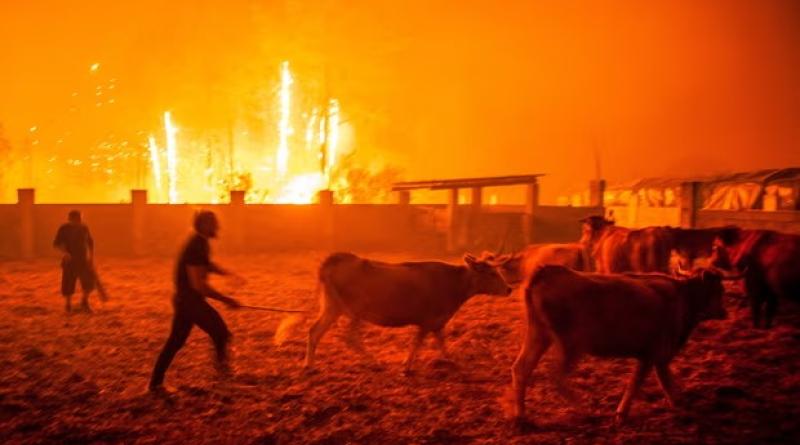UK one of 32 countries facing European court action over climate stance

Six Portuguese young people claim inadequate policies to tackle global heating breach their human rights
A key plank of the UK government’s defence against the biggest climate legal action in the world next week has fallen away as a result of the U-turn by the prime minister, Rishi Sunak, on green policies.
The UK is one of 32 countries being taken to the European court of human rights on Wednesday by a group of Portuguese young people. They will argue in the grand chamber of the Strasbourg court that the nations’ policies to tackle global heating are inadequate and in breach of their human rights obligations.
In its defence to the legal action, which is the biggest climate case yet taken across the globe, the UK government argues it is taking world-beating action to tackle climate change, with a legally binding target to reach net zero by 2050.
In documents submitted to the court, Kate Hughes, the director of international climate change at the Department for Business, Energy and Industrial Strategy, raises in evidence the government’s 10-point plan for a green industrial revolution, as proof of the tough policies being taken by the UK. The plan, she said, “has set out some of the concrete steps we will take to reach net zero emissions by 2050”.
But key policies in the plan, which was introduced by the former prime minister Boris Johnson, have now been scrapped by Sunak. These include the 2030 ban on the sale of new petrol and diesel cars and the policy to phase out the installation of gas boilers by 2035.
Lawyers representing the six young people taking the legal action are to present evidence that the current policies of the 32 countries mean the world is on track to reach 3C of global heating within their lifetimes and argue that the governments’ failure to act quickly enough to reduce emissions breaches the human rights of their clients.
The case will be heard on Wednesday at a full-day hearing in front of 17 judges when the removal of what is a key defence in the UK government’s case could become significant.
Gerry Liston, legal officer at Global Legal Action Network (GLAN), which is supporting the claimants, said: “The UK’s emissions targets are already inadequate. If every country pursues the same ambition level as the UK’s targets reflect, global warming would reach a catastrophic 3 degrees by the end of this century.
“Now is the time to be increasing ambition, not rolling back on existing commitments – especially when the Climate Change Committee has for some time now been sounding the alarm that the UK is well off course to meet its 2030 target. Rishi Sunak’s announcement is not only senseless and immoral, it is also illegal.”
The UK defence case against the claim argues the government is doing enough to meet its obligations. “The UK has taken wide-ranging measures to address climate change and, on any view is not in breach of its alleged obligations,” the defence documents state. The government bolsters its case by reference to the views of the independent Climate Change Committee (CCC), saying it has described the UK’s net zero target as “a world-leading commitment, placing the UK decisively on the path to net zero by 2050 at the latest”.
But the retreat this week on several key policies designed to ensure the UK meets its future carbon budgets and its legal obligation to reach net zero by 2050 has brought the government into direct collision with the committee.
Chris Stark, the chief executive of the CCC, said on Thursday: “It’s difficult to escape the idea that we’ve moved backwards from where we were when we did our last assessment of progress.
“We do that every single year, and we did that in June with what was the government’s old programme. And in June, what we said to the government was that it didn’t look like we were on track for the government’s targets in 2030. Remember, these are legal goals … it looks like those goals will be even harder to hit with this softer package now around climate policy.”
Aged from 11 to 24, the six Portuguese claimants say they were driven to act by their experiences in the wildfires that ripped through the Leiria region in 2017, killing 66 people and destroying about 20,000 hectares (50,000 acres) of forest.
Crowdfunded by people around the world who have donated more than £100,000, they are seeking a binding ruling from the judges to force the countries to rapidly escalate their emissions reductions in what would be a historic milestone in climate litigation.
Photograph: Ricardo Graca/EPA - Cattle being rounded up during a wildfire in Leiria in October 2017. The six young Portuguese taking the legal action said they were driven to do so by the wildfires there at the time.





